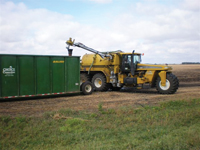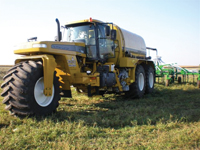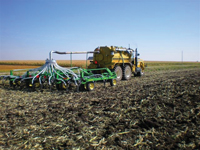
As environmental regulations were toughened up over the past 15 years
on intensive livestock operations, some took a negative view concerning
the impact that these more stringent manure handling and application
requirements would have on their bottom line.
As environmental regulations were toughened up over the past 15 years on intensive livestock operations, some took a negative view concerning the impact that these more stringent manure handling and application requirements would have on their bottom line. However, some recognized that by doing the right thing for themselves, this was also a new business opportunity to expand farm income.
 |
| Minnesota-based Choice Connection is attracting business by transporting liquid manure for application in fields that have never had manure applied to them, as a hedge against commercial fertilizer use. Contributed photos
|
 |
| The owners of Choice Connection custom manure applicators started out solely as hog and crop producers, but saw a business opportunity as application demands become more stringent.
|

|
| Choice Connection is able to pull a 31- foot tool bar behind its Terragator 9205 custom manure applicator. Advertisement
|
That’s what happened to Scott and Michelle Hislop. They own and operate their 144-year-old business called Hislop Farms and Choice Connection near Mapleton, Minnesota, about an hour and a half south of Minneapolis.
As they were developing their knowledge about manure spreading on their own farm, they reckoned it was probable that a lot more farmers in the area were in the market for a custom manure application service as well. Although there are a few dairy farms in the Mapleton area, the majority are hog producers. The main cash and feed crops are corn and soybeans.
In 2000, one of the Hislop companies, Choice Connection, launched a manure application business. This was also about the time when Agronomy Department Manager, Dave Malakowsky, joined the company. He has a degree in agronomy and mechanical agriculture from the University of Minnesota – Waseca. He’s seen the business evolve from an old 5,500-gallon slurry wagon and a handful of customers to a high-tech, Ag-Chem 9205 Terragator manure applicator. The company currently spreads about 20 million gallons of manure annually. Its customer mix is about 75 percent hog producers and 25 percent dairy.
One reason why customers call on Choice Connection is its ability to move large volumes of liquid manure over longer distances to cropland where application of organic fertilizer is needed.
“The value of precisely applying the fertilizer nutrients of manure keeps increasing every year,” says Malakowsky. “Like everybody else in the country, if you are a hog or dairy producer, you have manure and we’re trying to place it in fields where they will realize the most benefit. Instead of buying commercial NPK, we are helping them realize what they have and that they are actually saving money in the long run.”
Typically, they will haul the liquid manure about four to nine miles for application, but over the past year they have gone as far as 27 miles. Its customers’ desire to transport large volumes further distances was the main reason why Choice Connection opted to develop its business around transporting the manure using tanker trucks, using a field site holding tank and field applying using a rubbed tired, purpose-built manure application unit. A drag hose system, which limits where the manure can be economically applied by the length of hose and number of booster pumps attached to it, simply did not offer that option.
An important part of Choice Connection’s business plan is not only to operate profitably, but also to work safely, which includes an understanding of biosecurity requirements when spreading manure for hog producers. While many of their customers are owner-operator farms, they are raising hogs on contract for various corporations.
“The main thing is that we are coming there clean,” says Malakowsky. “We use a sanitizer on our equipment. We definitely wash our semi-tankers when we go from one farm operation to the next and get them as clean as we can, using four different area truck washes.”
Choice Connection has three Houle lagoon agitation pumps in its fleet, and a Balzer pump to transfer the manure from the pit to semi-tanker trucks. The company is extremely careful to ensure there is no leakage from its pumps, either during agitation or during the manure transfer process. The tankers also have sensor indicators showing when the tanks are coming close to being filled for safety and also to comply with highway load weight restrictions.
One procedure Choice Connection uses for biosecurity and to operate efficiently regarding their Terragator is using a 17,500-gallon Balzer holding tank in the field.
“We’re not cleaning the Terragator or tank as much because they are never coming into the yard where the manure is coming from,” says Malakowsky.
From an efficiency standpoint, Choice Connection is able to operate as many as four semi-tanker trucks each with about 7,000-gallon tanks from the manure source to the holding tank, while the single Terragator goes about its business transferring the liquid manure from the holding tank to its tank, and then carefully following the application program set out in the farmer’s nutrient management plan for each field.
Because the manure is being transported on public roads and the transfer process from tanker to holding tank is often taking place near field entrances, making sure that everyone gets home safely during the haul and application procedure is important. During the busy season, workers spend a lot of time working beside roads where sometimes there is a fair amount of traffic.
“We try to have beacon lights on our trucks and our semi drivers wear safety vests when they are on the highways,” says Malakowsky. The truck drivers are also careful to avoid spillage as the manure is transferred from the semi to the holding tank. Overall, the service provided to customers does require a lot of co-ordination.
After starting out on a smaller scale, Choice Connections made its first investment into a purpose-built custom application unit in 2004, selecting a four- wheel 3104 Ag-Chem Terragator with a 4,000-gallon tank.
“The Ag-Chem unit was a little higher price than just a regular manure tanker,” says Malakowsky, “but we decided to take on a lot more gallons. We had the equipment and thought we might as well just do it – go ahead and do some custom work and farm besides.” By 2006, they had increased from about six million gallons annually with their old tanker units to 20 million gallons with the new Ag-Chem unit, and the use of a second rental unit.
“That was kind of my goal, just to see how much business was out there,” says Malakowsky. “So I booked that much and we rented another Ag-Chem unit, and we did 19 million gallons that year. We learned a lot.” One of the most important lessons they learned is that there was more value hauling fewer gallons over longer distances, especially to fields that had never had manure applied before, which explains the company’s focus at the present time.
Because of the number of hours accumulated on the Ag-Chem Terragator 3104, Choice Connection traded that in for a 9205 Terragator in 2008.
“That was really a step up,” says Malakowsky. “It was 500 horsepower versus 300 horsepower, a bigger tank by 1,000 gallons and with auto steer.” It also provided the company with field mapping in the cab so that they could apply variable rates of manure in different parts of the field. Malakowsky sets the actual application rate with the customer based on pit nutrient content analysis and field requirements long before they arrive on site.
The five-wheel 9205 Terragator allows Choice Connection to pull a 31-foot toolbar with injector tubes placed a foot apart. It is essentially a John Deere 2410 chisel plow that they converted into a manure applicator. A Vogelsang distributor is connected to the Ag-Chem Terragator computer control system and controls the flow rate through the injectors. The Terragator also comes equipped with a superloader system that transfers a load of manure from the holding tank to the manure applicator tank in about two minutes, which is a major time saver for the company. During the application process, the Terragator is operating at between 7.5 and 8 miles per hour, which again is significantly faster than smaller Ag-Chem units. The software in the cab adjusts the application rate according to the speed of the unit. GPS co-ordinates displayed on a screen in the cab also show the operator exactly where he is located on the field.
Choice Connection has been able to bridge the income gap somewhat between the busy spring and fall application seasons by applying manure to alfalfa crops mainly for dairy operators. To serve these customers, the company has purchased a 21-foot wide Venius toolbar, which is manufactured in Europe. Malakowsky describes the toolbar as not an aerator but more like a disc opener, where the company will come in after the first and third cutting and apply between 3,000 to 4,000 gallons of manure per acre, placing the manure directly into the soil groove so the manure does not touch the alfalfa plant or damage it. Timing is everything in this instance, as the manure must be applied within seven days of the alfalfa being cut.
“The alfalfa is gaining all those nutrients against the next cutting,” says Malakowsky. “It really helps the alfalfa and our customers gain extra tonnage throughout the year.”
This toolbar is also used on pasture and after pea crops have been harvested.